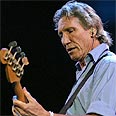

Palestinian academic opposes Israel boycott
Al-Quds University President Sari Nusseibeh says Israeli society is 'within academic community that we've had most progressive pro-peace views, views that have come out in favor of seeing us as equals'; meanwhile, international boycott threats, world concern about civilian deaths threaten to torpedo public relations honeymoon Israel has enjoyed since its pullout from Gaza
"If we are to look at Israeli society, it is within the academic community that we've had the most progressive pro-peace views and views that have come out in favor of seeing us as equals," Sari Nusseibeh told The Associated Press.
"If you want to punish any sector, this is the last one to approach," Nusseibeh added, acknowledging, however, that his is a minority viewpoint among his colleagues.
A pair of international boycott threats and world concern about civilian deaths in the Palestinian territories have threatened to torpedo the public relations honeymoon Israel has enjoyed since it pulled out of the Gaza Strip last year.
Tourism, foreign investment up
Britain's main academic association recently called on its members to consider boycotting Israeli professors, and a top Canadian labor union voted in favor of divestment from Israel. Those moves plus rising mayhem in Gaza that killed at least 15 civilians in recent days are dampening Israeli publicity coups - including a USD 4 billion investment by legendary tycoon Warren Buffet and a packed Tel Aviv concert by Sting.
The recent setbacks served as a reminder that Israel has a way to go before returning to the 1990's heyday of its world image - when interim peace accords with the Palestinians made cultural and financial links with Israel fashionable.
To be sure, Israelis are used to having their international standing hurt by high tensions with the Palestinians. But the boycott threats and renewed criticism of Israeli military actions come on the heels of a major image boost for Israel following last year's pullout from Gaza and the recent rise to power of Hamas.
Tourism and foreign investment are up, with Buffet shelling out his billions just last month for an 80 percent stake in a leading Israeli company. In June alone, Israel is playing host to concerts of Sting, the Black Eyed Peas, Pink Floyd's Roger Waters, Ziggy Marley and 50 Cent.
'Somehow Israel is always singled out'
Then came a June 9 explosion on a Gaza beach that killed seven civilians, including two babies. Images of a young girl running on the beach yelling for her dead father appeared in media around the world.
Palestinians said the cause was an Israeli artillery shell. Israel is having a hard time getting anyone to believe the results of its own investigation, which absolved the army of responsibility. On Saturday, three British newspapers said they had conducted their own probes supporting the Palestinian account.
On the day Israel released the results of its investigation, the army bombarded Gaza City's main street, killing a top militant but also eight civilians.
Also putting a damper on Israel's image honeymoon were two resolutions, one by the Ontario branch of the Canadian Union of Public Employees in support of divestment and the other from the 69,000-member National Association of Teachers in Further and Higher Education in Britain, censuring Israel for "Apartheid" policies.
"It just reminds people that somehow Israel is always singled out, that we're the case study," Said David Newman, a professor of politics and government at Israel's Ben Gurion University.
Neither the Canadian nor the British resolutions were considered earth shattering, but they underscored the fragility of Israel's long-standing efforts to win "normalcy" As it begins the 40th year of its occupation of Arab territories captured in the 1967 Mideast War.
Why not China?
Before Sting played to an audience of tens of thousands, a pro-Palestinian group urged him to cancel, saying his visit would contribute to the "deceptive image of Israel as a 'normal' state, thereby legitimizing its racism and colonial oppression."
"In fact, we view every international artist, academic or intellectual who visits Israel without condemning its illegal military occupation and colonization of Palestinian land as acquiescent in its oppression of the Palestinians," said a statement from the group called Palestinian Campaign for Boycott, Divestment and Sanctions against Israel.
Pink Floyd's Waters, though agreeing to play Israel later this month, responded positively to Palestinian protests by relocating his scheduled concert from a Tel Aviv park to a chickpea field next to a joint Jewish-Arab village.
Israel has been targeted by numerous boycotts throughout its history, ranging from weapons embargoes to product blacklisting to the blocking of Israeli web sites. But the latest resolution by the British association, encouraging a boycott of Israeli academics, touched a raw nerve in the Jewish state.
"I wonder why not China, why not Chile, why not Burma, where the human rights issue is far, far worse than here," said Newman.















